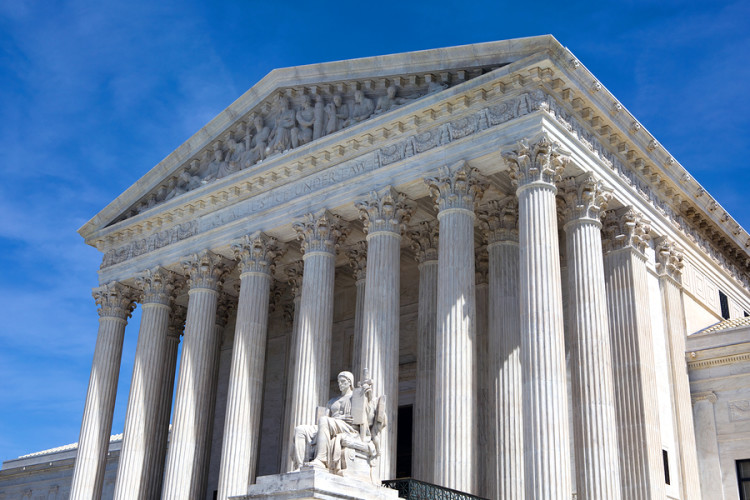Supreme Court Sets Itself Up for a Boring Term: Noah Feldman

published Oct 2nd 2016, 5:00 pm, by Noah Feldman
(Bloomberg View) —
The last Supreme Court term was strange by accident. Justice Antonin Scalia’s death in February left the court with only eight members, and several 4-4 decisions left major issues unresolved. Anticipated decisions on religious liberty, union dues and presidential power over deportation will have to wait for the court to return to nine justices. The big-ticket cases that were decided, on abortion and affirmative action, were products of Justice Anthony Kennedy’s move to the left.
The Supreme Court term that starts Monday will be strange by design. The Senate’s refusal to vote or even to hold a hearing on President Barack Obama’s nomination of Judge Merrick Garland means the court enters the term shorthanded.
The best case scenario for a fully functioning court is for Garland to be confirmed sometime between the presidential election in November and the beginning of January. Even if that were to happen, Garland most likely wouldn’t vote on cases that were argued before he joined the bench.
And if Hillary Clinton doesn’t win the presidency and/or Garland isn’t confirmed during the lame-duck session, there won’t be a new justice until well into the new year, almost certainly too late for that justice to sit on any cases. That would mean an entire term with only eight justices.
Faced with these two eventualities, the justices have responded with extreme caution. The cases they’ve already decided to hear reveal almost nothing highly controversial.
To be sure, there are a few close cases to watch, most of which the court hasn’t yet scheduled for oral argument.
One is a separation of church and state case, Trinity Lutheran Church of Columbia v. Pauley, about whether a neutral government funding program can be used by church. Columbia, Missouri, uses solid waste management funds to resurface playgrounds with a bouncy, rubber-based floor. The city refused to pay for resurfacing the playground in a church-owned preschool, citing establishment clause concerns. The court probably wouldn’t have agreed to hear the case unless the four establishment clause conservatives chose to do so, which gives strong reason to believe that there is already a 4-4 split on the case.
Another possibly close case is Bethune-Hill v. Virginia State Board of Elections, a redistricting case in which a special three-judge district court upheld the drawing of 12 Virginia House of Delegates districts against the charge that they were racially gerrymandered. Because the lower court decision was relatively permissive, there’s reason to think that the four justices needed to hear the case want to impose a stricter standard. That could well result in a 4-4 deadlock.
There’s also a death penalty case that could be close, unless Kennedy continues to move left on the issue. It involves the standard used by Texas to determine whether a person charged with capital murder suffers from an intellectual disability sufficient to render it unconstitutional to execute him. This issue has been before the court repeatedly in recent years, albeit without the justices specifying a clear standard that states must use.
The case, Moore v. Texas, comes from the state courts, which upheld the death sentence below. The four liberals doubtless voted to take the case. If Kennedy is on board, it could go 5-3, and help specify the correct standard. If not, this would be a classic 4-4 split — and a man would be executed because the court’s decision below would be affirmed by a divided court.
This is not to say that the rest of the cases the court will hear are boring. Pena-Rodriguez v. Colorado involves the fascinating question of whether to reopen a case when a juror’s racial bias is revealed after it’s over. Which is more important, jury room secrecy or racial fairness?
Lynch v. Morales-Santana involves a challenge to the federal immigration law that makes citizenship at birth harder for children of unwed U.S. citizen fathers born abroad than for children of unwed U.S. citizen mothers. The differences between patrilineal and matrilineal descent come up in many religious traditions and citizenship rules worldwide, and the case is sure to be a compelling one.
Family relations will also be front and center in the insider-trading case of U.S. v. Salman. The court will have to resolve a circuit split about whether tipping off a family member in violation of a fiduciary duty is itself a benefit sufficient to violate the insider-trading laws, or whether the government has to show that there was a further benefit. This case will also require some deeper exploration of the nature of insider-trading itself.
And the court has agreed to hear the In re Tam case, which raises the question of whether it violates the First Amendment for the government to refuse trademark registration to offensive marks like the all-Asian band called the Slants — or the National Football League’s Washington Redskins. This case is especially piquant given current debates about political correctness.
But the truth about the upcoming term is that so far, the justices have avoided taking cases that are likely to cause great controversy among them. That could change if Clinton is elected president, and it appears that Garland is about to be confirmed. But unless and until those things happen, this is shaping up to be a quiet year at the divided Supreme Court.
This column does not necessarily reflect the opinion of the editorial board or Bloomberg LP and its owners.
To contact the author of this story: Noah Feldman at nfeldman7@bloomberg.net To contact the editor responsible for this story: Stacey Shick at sshick@bloomberg.net
For more columns from Bloomberg View, visit Bloomberg view
COPYRIGHT © 2016 Bloomberg L.P
NICODES



No Comment